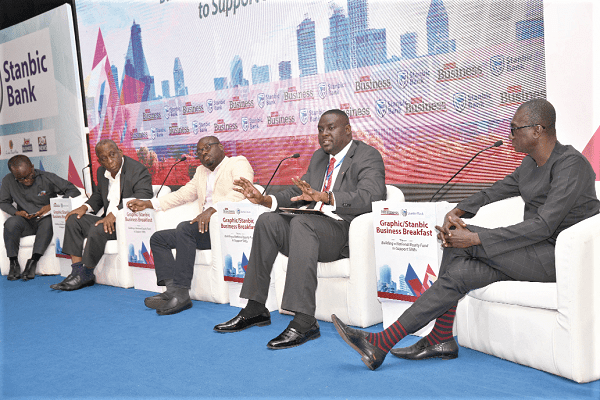
Panellists advocate equity fund for SMEs
Panellists and participants in the Graphic Business -Stanbic Bank Breakfast Forum have made a strong case for the establishment of a national equity fund to pool patient and low-cost funds for small and medium enterprises (SMEs) to use in unlocking their potential into global giants.
They said although SMEs were the future of entrepreneurship and industrialisation in the country, the current financial structure failed to embrace their peculiarities, resulting in the inability of these businesses to access funds for growth and survival.
They explained that this limited their survival and growth rates, resulting in majority of them either being marginalised or falling off in their first few years of operation.
However, the panellists and participants advised that the proposed national equity fund should be a private sector initiative but national in character with the state as a minority shareholder.
They were optimistic that such a structure would ensure that the proposed national equity fund was not exposed to the public sector bureaucracy and the political business cycle, which had the tendency to marginalise its effectiveness.
The proposed structure is also different from the Ghana Venture Capital Trust Fund (GVCTF), which was established in 2004 as a semblance of an equity fund to provide funding to SMEs.
In spite of supporting a few companies, the fund has been criticised for not doing enough to address the funding gap facing SMEs, hence the fresh proposal for a national equity fund.
Theme
The panellists and participants, who were drawn from the private sector, academia and development institutions, were contributing to the discussion on the topic: “Building a National Equity Fund to Support SMEs,” at the quarterly event.
The discussion was led by four panellists, namely Mr Edward Gomado, a Partner and Director at PricewaterhouseCoopers (PwC); Mr Nuamah Eshun-Famiye, the General Manager, Group Operations at the Kina Group; Dr Lord Mensah, a Senior Lecturer at the University of Ghana, and Mr Neustadt Amartefio, a Consultant at the International Finance Corporation.
The event is one of the thought leadership initiatives by the Graphic Communications Group Limited (GCGL), publishers of the Graphic Business and five other newspapers, and the Stanbic Bank Ghana Limited to help put a spotlight on key issues affecting the development of the country.
Past events had focused on finding solutions to the perennial cedi depreciation, getting the best out of the pensions industry and how to revive growth in manufacturing.
Banks must do more
Setting the tone for the discussion, the Managing Director of the Stanbic Bank, Mr Alhassan Andani, said the status of Africa as a continent that was beginning its renaissance meant that the welfare of SMEs must be critical to policy makers.
He underscored the need for the continent to find solutions to the problems facing SMEs and to ensure that “SMEs find feet to stand and to help propel our economies to get us out of all the problems of unemployment and most importantly, lack of participation in the global economic arena.”
He said although banks had been supporting SMEs, “I can say upfront here that the efforts of banks are not good enough.”
That, he said, informed the decision by Stanbic Bank Ghana, which is the local unit of Standard Bank of South Africa, to leverage its experience with SMEs through its partnership with the Graphic Business to deliberate on how to support such businesses to grow.
Efficiency problems
In his contribution, Dr Mensah said the proposed equity fund should be listed on the Ghana Stock Exchange to make it sustainable.
He said like exchange traded funds, the equity fund could become a commodity on the GSE that investors could invest in through the purchase of shares.
“Ownership is not supposed to be concentrated. If you leave it tilted too much to the government side, distribution becomes a problem; if you do not take time, funds will end up at places that may not necessarily be effective and if you do not take care, efficiency becomes a problem,” he said.
Market against SMEs
When he took his turn, Mr Eshun-Famiye said beyond finance, SMEs in Ghana were disadvantaged when it came to accessing market for their products.
“The market is against you here in Ghana,” he said, adding that the economy was so open to imports such that “you can bring anything from anywhere to sell here.
“So, really, once you add finance, the cost of energy and utility and the cost of even real estate — the rents we pay — it makes it not an attractive destination for you to invest here,” he said.
To address the challenge with access to markets, he called for an effective marketing strategy that will help expose the products of SMEs to consumers.
He also called for a “discounted environment” for SMEs that will ensure that such businesses were given tax and utility rebates as a way of grooming them into bigger enterprises.